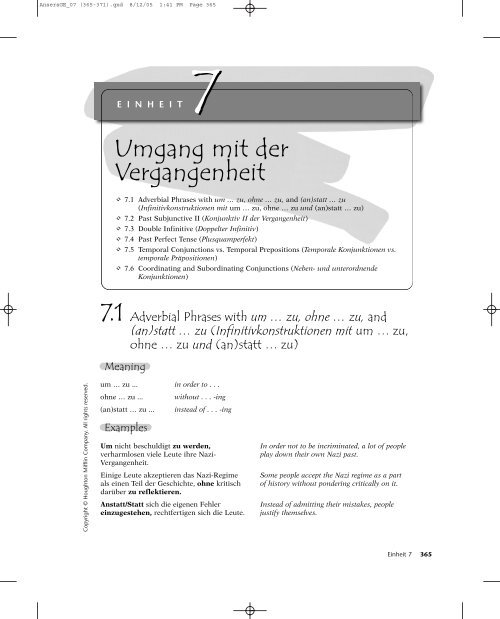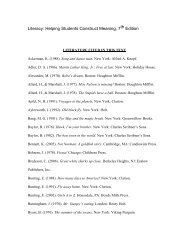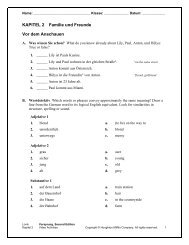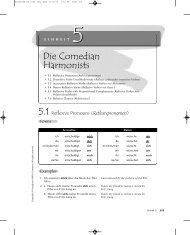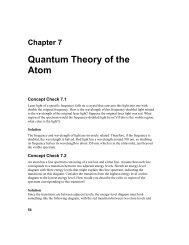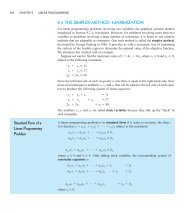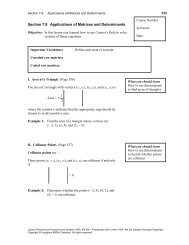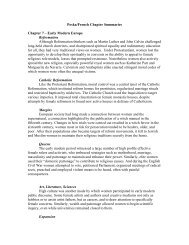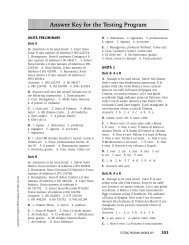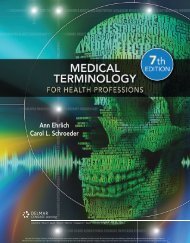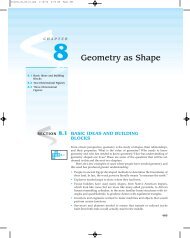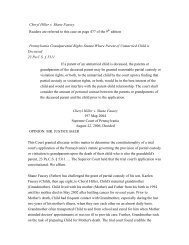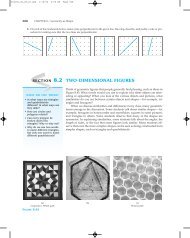(an)statt
(an)statt
(an)statt
Create successful ePaper yourself
Turn your PDF publications into a flip-book with our unique Google optimized e-Paper software.
AnsersGE_07 (365-371).qxd 8/12/05 1:41 PM Page 365<br />
E I N H E I T7<br />
Umg<strong>an</strong>g mit der<br />
Verg<strong>an</strong>genheit<br />
• 7.1 Adverbial Phrases with um … zu, ohne … zu, <strong>an</strong>d (<strong>an</strong>)<strong>statt</strong> … zu<br />
(Infinitivkonstruktionen mit um … zu, ohne … zu und (<strong>an</strong>)<strong>statt</strong> … zu)<br />
• 7.2 Past Subjunctive II (Konjunktiv II der Verg<strong>an</strong>genheit)<br />
• 7.3 Double Infinitive (Doppelter Infinitiv)<br />
• 7.4 Past Perfect Tense (Plusquamperfekt)<br />
• 7.5 Temporal Conjunctions vs. Temporal Prepositions (Temporale Konjunktionen vs.<br />
temporale Präpositionen)<br />
• 7.6 Coordinating <strong>an</strong>d Subordinating Conjunctions (Neben- und unterordnende<br />
Konjunktionen)<br />
7.1 Adverbial Phrases with um … zu, ohne … zu, <strong>an</strong>d<br />
(<strong>an</strong>)<strong>statt</strong> … zu (Infinitivkonstruktionen mit um … zu,<br />
ohne … zu und (<strong>an</strong>)<strong>statt</strong> … zu)<br />
Me<strong>an</strong>ing<br />
Copyright © Houghton Mifflin Comp<strong>an</strong>y. All rights reserved.<br />
um … zu ... in order to . . .<br />
ohne … zu ... without . . . -ing<br />
(<strong>an</strong>)<strong>statt</strong> … zu ... instead of . . . -ing<br />
Examples<br />
Um nicht beschuldigt zu werden,<br />
verharmlosen viele Leute ihre Nazi-<br />
Verg<strong>an</strong>genheit.<br />
Einige Leute akzeptieren das Nazi-Regime<br />
als einen Teil der Geschichte, ohne kritisch<br />
darüber zu reflektieren.<br />
An<strong>statt</strong>/Statt sich die eigenen Fehler<br />
einzugestehen, rechtfertigen sich die Leute.<br />
In order not to be incriminated, a lot of people<br />
play down their own Nazi past.<br />
Some people accept the Nazi regime as a part<br />
of history without pondering critically on it.<br />
Instead of admitting their mistakes, people<br />
justify themselves.<br />
Einheit 7<br />
365
AnsersGE_07 (365-371).qxd 8/12/05 1:41 PM Page 366<br />
Expl<strong>an</strong>ation<br />
Adverbial phrases with um … zu, ohne … zu, <strong>an</strong>d (<strong>an</strong>)<strong>statt</strong> … zu are dependent clauses. The<br />
dependent clause begins with either um, ohne, or (<strong>an</strong>)<strong>statt</strong> followed by a middle field <strong>an</strong>d<br />
ends with zu + INFINITIVE.<br />
7.2 Past Subjunctive II (Konjunktiv II der Verg<strong>an</strong>genheit)<br />
The past subjunctive II is used to express unreal past conditions <strong>an</strong>d wishes.<br />
Forms<br />
The past subjunctive II consists of two parts: It is formed with the present subjunctive II auxiliary<br />
form hätt- or wär- <strong>an</strong>d the past participle of the main verb.<br />
ich hätte … riskiert wir hätten … riskiert<br />
du hättest … riskiert<br />
ihr hättet … riskiert<br />
er/sie/es/m<strong>an</strong> hätte … riskiert sie/Sie hätten … riskiert<br />
ich wäre … gekommen wir wären … gekommen<br />
du wärst … gekommen ihr wärt … gekommen<br />
er/sie/es/m<strong>an</strong> wäre … gekommen sie/Sie wären … gekommen<br />
Example<br />
Wenn m<strong>an</strong> nicht mitgemacht hätte, wäre m<strong>an</strong><br />
in Teufels Küche gekommen.<br />
Expl<strong>an</strong>ation<br />
If one had not participated,<br />
one would have risked too much.<br />
There is only one past tense form of the subjunctive II. The rules for determining the use of<br />
hätt- or wär- are the same as for choosing sein or haben in the present perfect tense (see<br />
Einheit 3, Section 3.3). The past subjunctive II is used to express the same situations as the<br />
present tense subjunctive, with the exception of polite requests (see Einheit 4, Section 4.2).<br />
7.3 Double Infinitive (Doppelter Infinitiv)<br />
The modal verbs <strong>an</strong>d the verbs fühlen, hören, lassen, sehen, <strong>an</strong>d spüren often form the<br />
perfect tenses (present perfect, past perfect, past subjunctive) with a double infinitive instead<br />
of a past participle.<br />
Copyright © Houghton Mifflin Comp<strong>an</strong>y. All rights reserved.<br />
366 Anders gedacht: Grammar Expl<strong>an</strong>ations
AnsersGE_07 (365-371).qxd 8/12/05 1:41 PM Page 367<br />
Forms<br />
1. Present Perfect Tense<br />
ich habe … tun können<br />
wir haben … tun können<br />
du hast … tun können ihr habt … tun können<br />
er/sie/es/m<strong>an</strong> hat … tun können sie/Sie haben … tun können<br />
2. Past Perfect Tense<br />
ich hatte … tun können wir hatten … tun können<br />
du hattest … tun können ihr hattet … tun können<br />
er/sie/es/m<strong>an</strong> hatte … tun können sie/Sie hatten … tun können<br />
3. Past Subjunctive II<br />
ich hätte … tun können wir hätten … tun können<br />
du hättest … tun können ihr hättet … tun können<br />
er/sie/es/m<strong>an</strong> hätte … tun können sie/Sie hätten … tun können<br />
Examples<br />
Copyright © Houghton Mifflin Comp<strong>an</strong>y. All rights reserved.<br />
1. M<strong>an</strong> hätte nicht zusehen dürfen! People should not have just watched!<br />
Warum hat m<strong>an</strong> die <strong>an</strong>deren machen lassen? Why did people let the others do things?<br />
2. Wenn m<strong>an</strong> etwas dagegen hätte tun wollen, If one had w<strong>an</strong>ted to do something<br />
hätte m<strong>an</strong> etwas tun können.<br />
about it, one could have done something.<br />
Stimmt es, dass m<strong>an</strong> es nicht hat kommen Is it true that peple did not see it coming?<br />
sehen?<br />
Expl<strong>an</strong>ation<br />
1. The present perfect, past perfect, <strong>an</strong>d past subjunctive II tenses are formed with a conjugated<br />
form of haben + DOUBLE INFINITIVE if they include two main verbs. A double infinitive<br />
c<strong>an</strong> occur with modal verbs or with fühlen, hören, lassen, sehen or spüren.<br />
2. If the double infinitive is located in a dependent clause, all three verbs are at the end of the<br />
dependent clause; the order in all three tenses is: 1. conjugated form of haben, 2. infinitive<br />
of the first main verb, 3. infinitive of the modal verb or of fühlen, hören, lassen, sehen or<br />
spüren.<br />
Einheit 7<br />
367
AnsersGE_07 (365-371).qxd 8/12/05 1:41 PM Page 368<br />
7.4 Past Perfect Tense (Plusquamperfekt)<br />
Forms<br />
ich war … gekommen wir waren … gekommen<br />
du warst … gekommen ihr wart … gekommen<br />
er/sie/es/m<strong>an</strong> war … gekommen sie/Sie waren ... gekommen<br />
ich hatte … verloren wir hatten … verloren<br />
du hattest … verloren<br />
ihr hattet … verloren<br />
er/sie/es/m<strong>an</strong> hatte … verloren sie/Sie hatten … verloren<br />
Examples<br />
H<strong>an</strong>s ging in den Krieg, nachdem er Lene<br />
geheiratet hatte.<br />
Nachdem Anna zur Welt gekommen war,<br />
verließ Lene die Stadt.<br />
Als Lene schw<strong>an</strong>ger geworden ist, hatte sie<br />
H<strong>an</strong>s schon geheiratet.<br />
Nach Annas Geburt war Lene allein, weil<br />
H<strong>an</strong>s schon in den Krieg gezogen war.<br />
H<strong>an</strong>s went to war, after he had married<br />
Lene.<br />
After Anna had been born, Lene left town.<br />
When Lene got pregn<strong>an</strong>t, she had already<br />
married H<strong>an</strong>s.<br />
After Anna’s birth Lene was by herself,<br />
because H<strong>an</strong>s had already gone to war.<br />
Expl<strong>an</strong>ation<br />
The past perfect tense is used to express actions <strong>an</strong>d conditions that took place prior to <strong>an</strong>other<br />
past-time event, that is, <strong>an</strong> event that is referred to in the simple past or perfect tense. The past<br />
perfect tense never occurs by itself.<br />
The past perfect tense is very common in dependent clauses introduced by nachdem (see<br />
above), whereas it is rarely used with bevor.<br />
7.5 Temporal Conjunctions vs. Temporal Prepositions<br />
(Temporale Konjunktionen vs. temporale Präpositionen)<br />
Me<strong>an</strong>ing<br />
bevor; vor (+ dat.)<br />
nachdem; nach (+ dat.)<br />
before<br />
after<br />
seit(dem); seit (+ dat.)<br />
während; während (+ gen.)<br />
since<br />
while; during<br />
Copyright © Houghton Mifflin Comp<strong>an</strong>y. All rights reserved.<br />
368 Anders gedacht: Grammar Expl<strong>an</strong>ations
AnsersGE_07 (365-371).qxd 8/12/05 1:41 PM Page 369<br />
Examples<br />
Conjunction<br />
Bevor H<strong>an</strong>s in den Krieg musste, heiratete er<br />
Lene.<br />
Before H<strong>an</strong>s had to go to war, he married Lene.<br />
Nachdem H<strong>an</strong>s Lene geheiratet hatte, ging er<br />
in den Krieg.<br />
After H<strong>an</strong>s had married Lene, he went to war.<br />
H<strong>an</strong>s und Lene sehen sich nur selten, seit/<br />
seitdem sie geheiratet haben.<br />
H<strong>an</strong>s <strong>an</strong>d Lene rarely see each other since they<br />
got married.<br />
Während H<strong>an</strong>s im Krieg ist, zieht Lene das<br />
Kind groß.<br />
While H<strong>an</strong>s is at war, Lene raises the child.<br />
Expl<strong>an</strong>ation<br />
Preposition<br />
Vor dem Krieg heiratete H<strong>an</strong>s Lene.<br />
Before the war H<strong>an</strong>s married Lene.<br />
Nach der Hochzeit mit Lene ging H<strong>an</strong>s in den<br />
Krieg.<br />
After the wedding with Lene, H<strong>an</strong>s went to war.<br />
H<strong>an</strong>s und Lene sehen sich seit der Hochzeit<br />
selten.<br />
H<strong>an</strong>s <strong>an</strong>d Lene rarely see each other since the<br />
wedding.<br />
Während des Krieges zieht Lene alleine das<br />
Kind groß.<br />
During the war Lene raises the child all by<br />
herself.<br />
There are two different ways of expressing the same condition, one with a subordinating conjunction<br />
<strong>an</strong>d one with a preposition. Remember to place the verb at the end of the dependent<br />
clause when using a subordinating conjunction.<br />
When using nachdem make sure you are using the correct tenses in both main clause <strong>an</strong>d<br />
dependent clause:<br />
nachdem-Clause (Dependent Clause)<br />
Main Clause<br />
Copyright © Houghton Mifflin Comp<strong>an</strong>y. All rights reserved.<br />
Examples<br />
past perfect tense simple past tense<br />
present perfect tense<br />
present perfect tense present tense<br />
future tense<br />
Past: Nachdem H<strong>an</strong>s Lene geheiratet hatte, ... ging er in den Krieg.<br />
… ist er in den Krieg geg<strong>an</strong>gen.<br />
Present: Nachdem H<strong>an</strong>s Lene geheiratet hat, ... geht er in den Krieg.<br />
… wird er in den Krieg gehen.<br />
Einheit 7<br />
369
AnsersGE_07 (365-371).qxd 8/12/05 1:41 PM Page 370<br />
7.6 Coordinating <strong>an</strong>d Subordinating Conjunctions<br />
(Neben- und unterordnende Konjunktionen)<br />
Me<strong>an</strong>ing<br />
Subordinating Conjunctions: conjunction +<br />
dependent clause<br />
CCoordinating Conjunctions: conjunction<br />
(position 0) + main clause<br />
als when, as<br />
als ob as if<br />
bevor/ehe before<br />
bis until, by<br />
da since, because<br />
damit so that<br />
dass that<br />
falls in case, if<br />
indem by (doing)<br />
nachdem after<br />
ob whether, if<br />
obwohl although, even though<br />
seit(dem) since<br />
sobald as soon as<br />
sol<strong>an</strong>ge as long as<br />
sooft as often as<br />
während while<br />
weil because<br />
wenn when, if, whenever<br />
aber but, however<br />
denn for, because<br />
oder or<br />
sondern but rather<br />
und <strong>an</strong>d<br />
Adverbial Conjunctions:<br />
conjunction (position 1) + main clause<br />
außerdem moreover, furthermore<br />
aus diesem Grund; daher/darum/deshalb/deswegen<br />
dennoch nevertheless, yet<br />
<strong>statt</strong>dessen instead<br />
trotzdem in spite of<br />
therefore, thus, for this reason<br />
Copyright © Houghton Mifflin Comp<strong>an</strong>y. All rights reserved.<br />
370 Anders gedacht: Grammar Expl<strong>an</strong>ations
AnsersGE_07 (365-371).qxd 8/12/05 1:41 PM Page 371<br />
Examples<br />
1. Als seine Tochter erwachsen war, wollte<br />
der Müller sie verheiraten.<br />
2. Das Mädchen hatte ihren Bräutigam<br />
nicht so recht lieb und es hatte auch<br />
kein Vertrauen zu ihm.<br />
3. Das Mädchen hatte Angst, deshalb<br />
streute es Erbsen auf den Weg.<br />
4 a. Als ein Freier kam, gab ihm der<br />
Müller seine Tochter zur Frau.<br />
b. Als das Mädchen noch klein war, starb<br />
seine Mutter.<br />
c. Immer wenn sie sich trafen, hatte die<br />
Tochter Angst.<br />
d. Wenn die alte Frau dem Mädchen<br />
nicht geholfen hätte, wäre das<br />
Mädchen gestorben.<br />
e. Wenn ein neuer Freier kommt, wird<br />
das Mädchen ihn heiraten.<br />
When his daughter had grown up, the miller<br />
w<strong>an</strong>ted to give her in marriage.<br />
The girl did not really like her fi<strong>an</strong>cé <strong>an</strong>d she did<br />
not trust him either.<br />
The girl was afraid, therefore she spread peas on<br />
the path.<br />
When a suitor came, the miller gave him his<br />
daughter as his wife.<br />
When the girl was still little, her mother<br />
died.<br />
Every time they met, the daughter was<br />
afraid.<br />
If the old wom<strong>an</strong> hadn’t helped the girl, the<br />
girl would have died.<br />
If <strong>an</strong>other suitor comes, the girl will marry<br />
him.<br />
Expl<strong>an</strong>ation<br />
There are three different kinds of conjunctions.<br />
1. Subordinating conjunctions are followed by a dependent clause.<br />
2. Coordinating conjunctions are followed by a main clause. The coordinating conjunction is<br />
in position 0.<br />
Copyright © Houghton Mifflin Comp<strong>an</strong>y. All rights reserved.<br />
3. Adverbial conjunctions are also followed by a main clause, but the adverbial conjunction is<br />
in position 1.<br />
4. The conjunction als is used for<br />
• actions in the past that occurred only once (Example a)<br />
• actions in the present that have occurred only once<br />
• time periods in the past (Example b).<br />
The conjunction wenn is used for<br />
• repeated actions in the past (Example c)<br />
• repeated actions in the present<br />
• conditional phrases (Example d)<br />
• actions that will happen in the future (Example e).<br />
Einheit 7<br />
371


